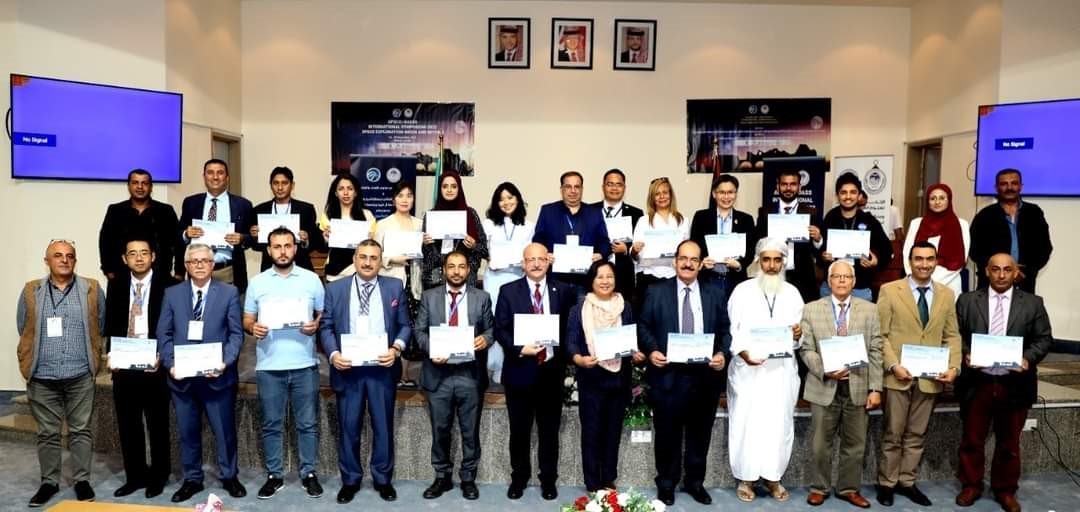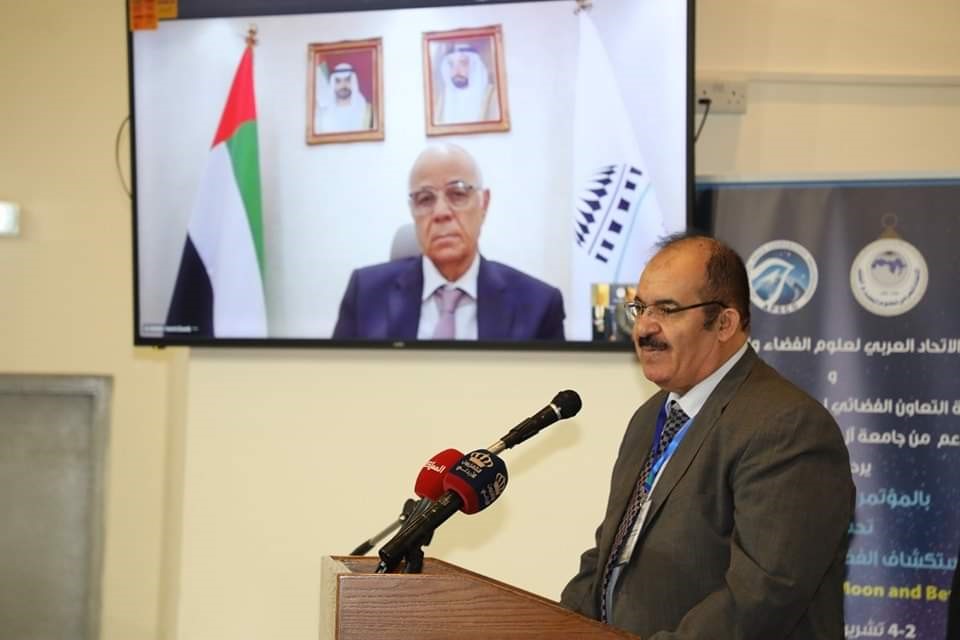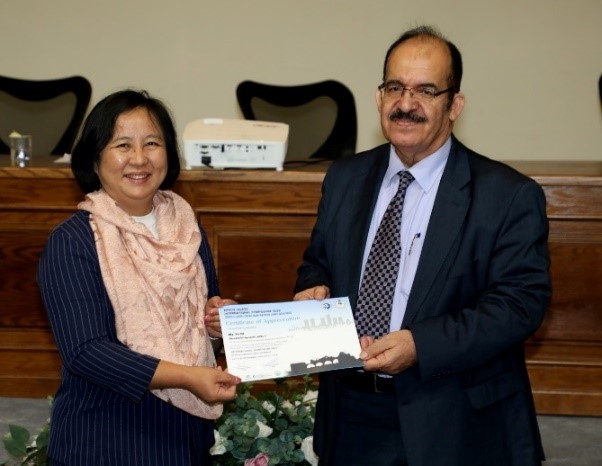First World Congress on Space Exploration: The Moon and Beyond

The activities of the First World Conference 2022 on Space Exploration: The Moon and Beyond were held at Al al-Bayt University under the patronage of the university’s president, Professor Dr. Hani Al-Dmour, from Wednesday, November 2, 2022, to Friday, November 4, 2022, at the Engineering College auditorium.
This conference was organized jointly by the Arab Union for Astronomy and Space Sciences, the Asia-Pacific Space Cooperation Organization (APSCO), with the support of Al al-Bayt University and the University of Sharjah. It featured broad Arab and international participation, with sixteen Arab and foreign countries presenting numerous scientific papers in the field of space and astronomy. Notably, the conference was held both physically and virtually, with several research papers presented remotely.
The idea behind this conference coincided with the fiftieth anniversary of the last manned spacecraft landing on the moon in 1972. It was part of a global campaign by space research centers and institutes, focusing on the future of space exploration, such as sending humans to Mars, studying the existence of life on other planets, and establishing human settlements on the moon.
Dr. Awni Mohammed Al-Khasawneh, the Secretary-General of the Arab Union for Astronomy and Space Sciences, expressed gratitude to Al al-Bayt University, represented by its president, Professor Dr. Hani Al-Dmour, for hosting this distinguished international conference, which was attended by representatives from Asia, Africa, and Europe. Al al-Bayt University was the first institution in Jordan to teach astronomy through the establishment of the Institute of Space and Astronomy Sciences, which produced the first Jordanian astronomers with master’s degrees. The university also boasts the Ma’raqah Observatory, the first observatory in the Hashemite Kingdom of Jordan.
Dr. Al-Khasawneh also expressed his sincere thanks to Dr. Hamid Majeed Al Naimi, the President of the Arab Union for Astronomy and Space Sciences and the Director of the University of Sharjah, for his significant role in developing space and astronomy science and for his continuous support of this conference, “Space Exploration: The Moon and Beyond,” in collaboration with APSCO.
During his opening speech, Dr. Al Naimi highlighted the importance of space technology and astronomy and called for horizontal cooperation between Arab countries and the Arab Union for Astronomy and Space Sciences, which comprises more than 18 countries, as well as with global specialized organizations. He also discussed the achievements of the United Arab Emirates, represented by the University of Sharjah and the Sharjah Academy for Space Science and Technology, and anticipated future achievements, such as the launch of the Rashid Explorer.
He mentioned various available specializations for study at the Sharjah Academy for Space Science and Technology and the faculties of Science and Engineering at the University of Sharjah, focusing on attracting, educating, and training future youth. Additionally, he highlighted the final stages of launching the first small cube satellite, Sharjah SAT 1, expected to be launched at the end of December 2022. Dr. Al Naimi emphasized the significant role of the Arab Union for Astronomy and Space Sciences in developing space and astronomy in the Arab region.
The conference was attended by astronomy and space enthusiasts from all segments of society, who actively participated in its events. Participants presented valuable information and research, attracting experts from various Jordanian universities.
This conference was organized jointly by the Arab Union for Astronomy and Space Sciences, the Asia-Pacific Space Cooperation Organization (APSCO), with the support of Al al-Bayt University and the University of Sharjah. It featured broad Arab and international participation, with sixteen Arab and foreign countries presenting numerous scientific papers in the field of space and astronomy. Notably, the conference was held both physically and virtually, with several research papers presented remotely.
The idea behind this conference coincided with the fiftieth anniversary of the last manned spacecraft landing on the moon in 1972. It was part of a global campaign by space research centers and institutes, focusing on the future of space exploration, such as sending humans to Mars, studying the existence of life on other planets, and establishing human settlements on the moon.
Dr. Awni Mohammed Al-Khasawneh, the Secretary-General of the Arab Union for Astronomy and Space Sciences, expressed gratitude to Al al-Bayt University, represented by its president, Professor Dr. Hani Al-Dmour, for hosting this distinguished international conference, which was attended by representatives from Asia, Africa, and Europe. Al al-Bayt University was the first institution in Jordan to teach astronomy through the establishment of the Institute of Space and Astronomy Sciences, which produced the first Jordanian astronomers with master’s degrees. The university also boasts the Ma’raqah Observatory, the first observatory in the Hashemite Kingdom of Jordan.
Dr. Al-Khasawneh also expressed his sincere thanks to Dr. Hamid Majeed Al Naimi, the President of the Arab Union for Astronomy and Space Sciences and the Director of the University of Sharjah, for his significant role in developing space and astronomy science and for his continuous support of this conference, “Space Exploration: The Moon and Beyond,” in collaboration with APSCO.
During his opening speech, Dr. Al Naimi highlighted the importance of space technology and astronomy and called for horizontal cooperation between Arab countries and the Arab Union for Astronomy and Space Sciences, which comprises more than 18 countries, as well as with global specialized organizations. He also discussed the achievements of the United Arab Emirates, represented by the University of Sharjah and the Sharjah Academy for Space Science and Technology, and anticipated future achievements, such as the launch of the Rashid Explorer.
He mentioned various available specializations for study at the Sharjah Academy for Space Science and Technology and the faculties of Science and Engineering at the University of Sharjah, focusing on attracting, educating, and training future youth. Additionally, he highlighted the final stages of launching the first small cube satellite, Sharjah SAT 1, expected to be launched at the end of December 2022. Dr. Al Naimi emphasized the significant role of the Arab Union for Astronomy and Space Sciences in developing space and astronomy in the Arab region.
The conference was attended by astronomy and space enthusiasts from all segments of society, who actively participated in its events. Participants presented valuable information and research, attracting experts from various Jordanian universities.




